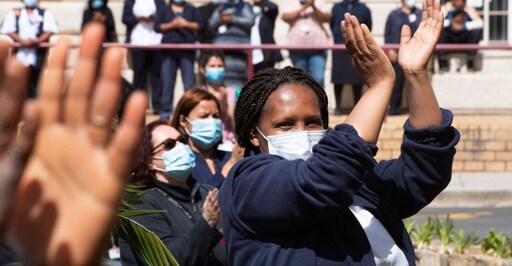
Health care workers applaud outside a hospital in September 2021 in Cape Town. | Rodger Bosch/AFP via Getty Images
It’s not an exaggeration to say that hope is in short supply these days in global health. The steep cuts to lifesaving global health programs, the burning of emergency food supplies, the renewed politicization of vaccines are just a few of the bleak developments that have happened since the start of the year.
But that narrow view misses the quiet progress happening around the world.
Just last week, the Maldives — a tiny archipelago in the Arabian Sea — became the first country in the world to eliminate the transmission of hepatitis B, HIV, and syphilis from mother to child. That’s no small feat. Across Southeast Asia, thousands of pregnant women still pass on these infections to their babies each year. Hepatitis B alone affects more than 42 million people in the region, according to the World Health Organization.
This story was first featured in the Future Perfect newsletter.
Sign up here to explore the big, complicated problems the world faces and the most efficient ways to solve them. Sent twice a week.
For one country to shut down the transmission of all three is a genuine public-health moonshot.
That was possible because of the country’s universal health coverage, which has enabled almost every expectant mother to receive antenatal care during her pregnancy that includes a test for HIV, syphilis, and hepatitis B. And over 95 percent of newborns in the country receive the first dose of the hepatitis B vaccine within 24 hours of delivery. (Meanwhile, the US is pushing to delay that childhood dose of hepatitis B.) The Maldives also spends about 10 percent of its GDP on health — among the highest in Asia — a number that’s climbed steadily since it introduced universal health coverage in 2012. (My colleague, Dylan Scott, has written about how other countries make universal health care work, and what the US can learn from it.)
It’s a remarkable achievement for a small island nation with limited resources. “This historic milestone provides hope and inspiration for countries everywhere working towards the same goal,” WHO’s director-general Tedros Adhanom Ghebreyesus said in a press release.
But even countries that don’t spend 10 percent of their GDP on health are making meaningful progress to stop deadly infectious diseases.
The Democratic Republic of Congo, a country that has faced recurring Ebola outbreaks since the late 1970s, has managed to swiftly get its latest one under control. The latest outbreak, declared on September 4, infected 64 people and killed 43.
But on Sunday, the WHO announced that the country’s last patient had been discharged. There have been no new cases since September 25 — a notably quick containment for a virus that, in past outbreaks, has lingered for months.
Containing the virus wasn’t easy, as the outbreak largely unfolded in remote, rural communities. Yet the response from local health workers and teams from the WHO kept it from spreading further. Now, a 42-day countdown — twice Ebola’s 21-day incubation period, long enough to be sure no new infections emerge — is underway. If no new cases emerge during that window, the outbreak will be officially declared over.
There’s progress too, against lesser-known but equally consequential infectious diseases.
Fiji, an island nation in the South Pacific Ocean, recently became the 26th country to eliminate trachoma, a bacterial infection that affects the inner layer of the eyelid and can lead to permanent blindness if untreated. (In 2021, trachoma blinded an estimated 400,000 people globally.)
The win didn’t come out of nowhere. Since 2012, researchers with the Global Trachoma Mapping Project, funded in part by USAID, have surveyed over 2.6 million people across 35 countries to pinpoint where trachoma infections still persist. That data has allowed countries to target antibiotics to high-risk populations, improve access to clean water and sanitation, expand access to surgery, and to promote hygiene education. Fiji used the same set of strategies to join the growing list of countries free of trachoma.
Maldives, Congo, and Fiji are vastly different countries — in geography, resources, and the diseases they face — but together they tell a hopeful story in global public health: With a sustained investment in health, the political will to match, and relentless community-level work, progress against even the most persistent problems is possible.
A version of this story originally appeared in the Future Perfect newsletter. Sign up here!
From Vox via this RSS feed


